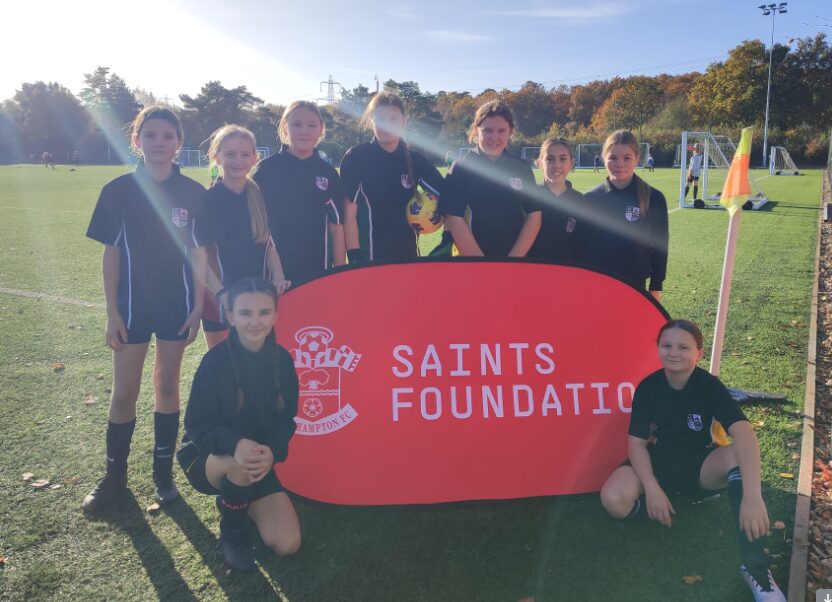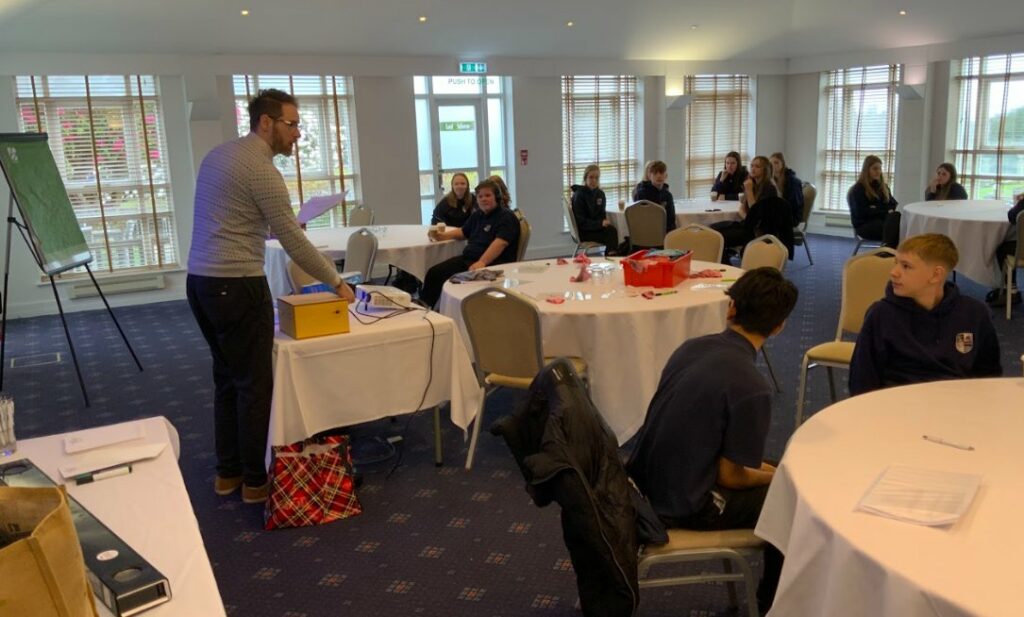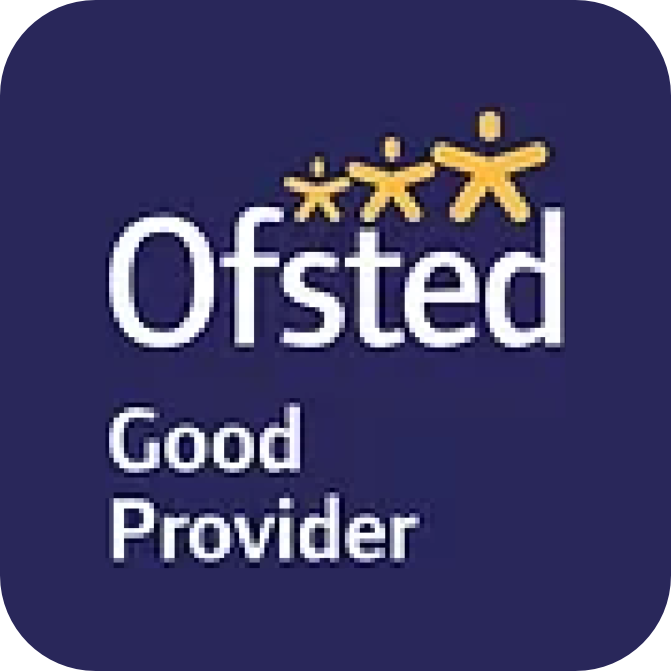What is the Literacy and Numeracy Catch-Up Premium?
The literacy and numeracy catch-up premium gives state-funded schools, including special schools and alternative provision settings, additional funding to support year 7 pupils who did not achieve the expected standard in reading or maths at the end of key stage 2 ( KS2 ).
Catch-Up Allocation
2020-21 = £22,595
Our Catch-Up Strategy at Redbridge
The Programme in 2021/22:
A programme will run for both year 7 and year 8 to ensure all students receive their entitlement to catch up. Year 9 students will have a literacy session during ‘Enrichment Fortnight’ in tutor time.
Session Aims:
To develop students’ confidence in their reading and writing abilities by:
- Equipping students with the tools they need to build on their reading comprehension and inference skills
- Expanding students’ vocabulary through explicit instruction
- Improving students’ use of accurate and varied sentence structures.
Specific Teaching:
- Literal and inferential understanding of a text
- Vocabulary instruction
- Sentence drills.
Tracking and Monitoring of Progress:
- Mini AFL checks at the end of each session
- Literacy Knowledge and Skills test data
- Reading Age Data.
2021/2022 Impact
For students with comparable data (e.g no absences between assessments), the following was observed between the spring and summer knowledge test:
In spring, the average percent achieved was 34%.
By summer, this has risen to 40%
The average reading age of the group remained the same at 8 years 3 months between both data sets.
Anecdotally, teachers reported that they had noticed improvements. One comment read as follows:
“CC definitely has more reading confidence compared to the beginning of this year and his writing does show some more conscious thought. His Literacy Test scores stay quite uniform as his absence is quite high but I can spot some positive changes, no doubt as a result of the intervention.”
The Programme in 2020/21:
Session Aims:
- To improve students’ knowledge of various areas of literacy (predominantly sentence construction) in preparation for the literacy knowledge test
- To promote students making conscious choices with their language to make their writing more creative
- To improve students’ reading skills
- To improve students’ confidence in their reading and writing ability
Specific Teaching:
- Sentence parts and types, punctuation and proof reading (using the iBridge)
- Use ‘Scarborough’s Reading Rope’ to teach different elements of reading focusing on vocabulary and comprehension
- Developing use of vocabulary for effect and linguistic devices.
Tracking and Monitoring of Progress:
- Mini AFL checks at the end of each session
- Literacy Knowledge and Skills test data
- Reading Age Data
2020/2021 Impact
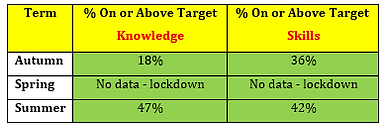
The Programme in 2019/20:
Session Aims:
- To improve students’ knowledge of various areas of literacy (predominantly sentence construction) in preparation for the literacy knowledge test
- To improve students’ reading skills
- To improve students’ knowledge of spelling rules
- To improve students’ confidence in their reading and writing ability
Specific Teaching:
- Sentence parts and types, punctuation and proof reading (using the iBridge)
- Use ‘Scarborough’s Reading Rope’ to teach different elements of reading focusing on vocabulary and inference
- Teaching definition of root words, prefixes and suffixes to help students begin understand spelling rules and to aid with decoding of unfamiliar words
- Teaching linked to curriculum support spelling rules
Tracking and Monitoring of Progress:
- Mini AFL checks at the end of each session
- Literacy Knowledge and Skills test data
- Reading Age Data
2019/2020 Impact
No impact data due to lockdown and school closures.
The Programme and its Impact in 2018/19
Each session included a pre and post-test, to gauge student progress:
- 100% of students improved in all sessions
Retention of this knowledge is vital to ensure that skills are transferred to lessons:

Whole school focus on reading:
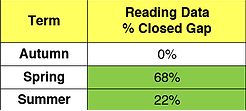
The Programme and its Impact in 2017/18
Each session included a pre and post-test, to gauge student progress:
- 100% of students improved in all sessions
- On average, students improved by 55%
The Programme and its Impact in 2016/17
- Assessment 1 – 13% of the Catch-Up Premium students achieved “on or above expected progress” in both their knowledge and skills tests
- Assessment 2 – 69% of the Catch-Up Premium students achieved “on or above expected progress” in both their knowledge and skills tests
- Assessment 3 – 89% of the Catch-Up Premium students achieved “on or above expected progress” in both their knowledge and skills tests
- Assessment 4 – 75% of the Catch-Up Premium students achieved “on or above expected progress” in both their knowledge and skills tests
We also provide these students with a Read2 mentor. This involves our readers having a one-to-one session with a mentor where they can read a book of their choice in a safe environment.
For some students, reading can be a daunting task, especially if they cannot find a book that engages them or they find too challenging. Read2 allows them to spend time with a mentor talking about books, taking the time to find something they will enjoy reading and having the opportunity to read with someone who can support them.
Some students read novels whilst others read factual books and this is entirely up to them. Ultimately, we want students to take pleasure in reading and have the opportunity to read, or be read to by someone, for a period of time. This has been a very successful scheme alongside the Accelerated Reader programme, as students feel more confident when reading out loud in lessons and begin to use the library on a more regular basis.
Read2 Impact
2020/21 (up to March)
Unfortunately this could not take place due to bubbles being in place and the closure of the library due to COVID.
2019/20 (up to March)
- 63% of students were beginning to close the reading age gap
- No surveys were taken at this time
2018/19
- 61% of Catch up students closed the gap between their reading age and actual age
- 83% or students felt more confident when reading
- 92% of students said they wanted to read more from our new library selection
- 42% of students said they would read more at home
- 67% of students enjoy reading more
2017/18
- 50% of Catch-Up students closed the gap between their reading age and actual age
- 100% of students thought they were more confident readers or had read a book they enjoyed
2016/17 (Now tracking if students are closing the reading age gap)
- 50% of Catch-Up students have closed the gap between their reading age and their actual age. This is a more precise figure and allows us to track real progress in reading
- 100% of students felt that this was a worthwhile experience and that they were growing in confidence as a reader. The regular reading tests are helpful to allow students to track their own progress
What Some Students have said about this programme
“I like working with my mentor – she is nice”
“I like reading”
“I’ve improved my communication skills”
“It has built up my confidence with reading”
“My mentor has helped me with the words I found difficult”
“I enjoy it”
The Numeracy Programme
Session aims:
- To improve students’ engagement and enjoyment of Maths
- To improve students’ confidence in Maths
- To improve students’ basic Numeracy
- To improve students’ knowledge and skills on the topic that are being covered in Maths lessons
Specific Teaching:
- Catch up sessions follow the scheme of work for year 7 so that they mirror what students are doing in class
- Topics are delivered using contextual or practical methods to improve understanding
- Smaller group work means students are confident to ask questions and teachers are able to identify and address individual misconceptions
- Students are chosen using KS2 data. Those already receiving numeracy lessons through curriculum support do not qualify.
Tracking and Monitoring of progress:
- Pre and post-test across the year
- Mini AFL checks throughout each session
- Maths knowledge and skills test data
- Student surveys
Catch-Up Strategy Impact: Numeracy
2020/21
Only 2 sessions took place due to school closures.
2019/20
Students completed a pre-test at the start of the year but the post-test did not take place due to school closure in the summer term. 4 sessions were undertaken.
All but 3 students made progress in their in class knowledge & skills tests. In session 3 (shape topic) a mini pre /post test was undertaken covering both knowledge & skills.
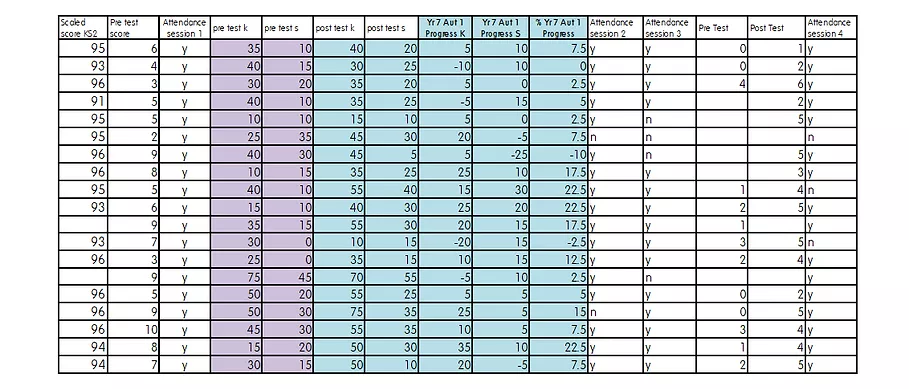
2018/19
Students were surveyed at the beginning and end of the school year:
September

July

Average progress of Catch up students in Maths was the same or exceeded that of the whole year 7 cohort in 4 out of 5 half terms.
2017/18
Pre and post-tests in every session showed that 100% of students made progress.
We also surveyed the students at the end of the year:
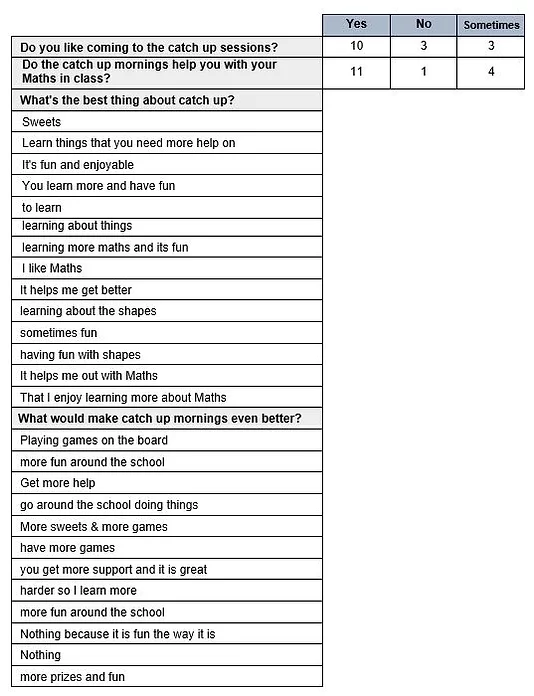
The Impact of iMultiply at Redbridge Community School
iMultiply during tutor:
A selection of mathematics questions used by all tutor groups in the school on a weekly basis for the whole academic year.
The selection of workbooks were completely revamped for a fresh start across all years and it now occurs all year long, instead of alternating half terms, as in previous years.
For half of the year, year 7 and 8 workbook contains a series of 5 minute tasks that assess a number of fundamental mathematical skills. The workbook is called “Numeracy Ninjas”, students achieve Ninja Belts according to how many correct answers they achieve. The mathematics department has been using similar workbooks for a number of years.
Similarly, for half of the year, Year 9, 10 and 11 are given differentiated workbooks that were allocated based on previous attainment in maths. These workbooks focussed on word problems and problem solving questions using a mixture of essential maths skills, geared towards preparing for the maths GCSE.
Recording of all workbooks was made more robust, using centralised spreadsheets. Success is recognised and students in KS4 are able to move on to more challenging workbooks.
During the other half of the year students complete sets of quick fire questions focussed on the four operations.
Impact: All students are being challenged to improve in numeracy / maths during tutor periods throughout the school year. Success is easier to track, students see more value in completing the workbooks.
iMultiply Weeks:
Every half term there is one week dedicated to multiplication grids being delivered in every lesson (except Year 11).
Students complete a 6 by 6 multiplication grid in their lessons (including lessons other than maths), in some cases competing against their teacher.
Impact: Students improving in their times table recall.
Multiplication Grids:
This year we have revamped the way students practice their times table recall. Students will continue to complete the same 6 by 6 grid during iMultiply weeks to assess progress. However, practice now takes the form of increasingly difficult levels of multiplication grids. We’ve used the seven colours of the rainbow to signify the difficulty – red being the easiest and violet being the most difficult.
When students complete a colour all correct in under three minutes they move onto a the next level. This new way of practice, illustrates progress and provides more appropriate challenge across all attainment levels.
Impact: Despite the disrupted school year, in 2020-2021, 116 more students could complete the 6 by 6 grid compared to the beginning of the school year



